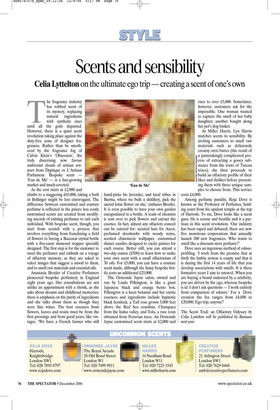Scents and sensibility
Celia Lyttelton on the ultimate ego trip — creating a scent of one’s own The fragrance industry has robbed scent of its mystery, replacing natural ingredients with synthetic ones until all the gods departed. However, there is a quiet scent revolution taking place against the duty-free zone of designer fragrances. Rather than be smothered by the fragrance fog of Calvin Klein’s ‘Obsession’, the truly discerning now favour ambrosial clouds of artisan senteurs from Dyptique or L’Artisan Parfumeur. Bespoke scent — ‘Eau de Me’ — is a fast-growing market and much coveted.
As the cost starts at £2,000 and climbs to a staggering £65,000, taking a bath in Bollinger might be less extravagant. The difference between customised and couture perfume is reflected in the prices; less costly customised scents are created from modifying accords of existing perfumes to suit each individual. With bespoke scent, though, you start from scratch with a process that involves everything from franchising a field of flowers to having a Baccarat crystal bottle with a five-carat diamond stopper specially designed. The first step is for the customer to meet the perfumer and embark on a voyage of olfactory memory, as they are asked to select images that suggest a mood to them, and to smell raw materials and essential oils.
Anastasia Brozler of Creative Perfumers pioneered bespoke perfumery in England eight years ago. Her consultations are not unlike an appointment with a shrink, as she asks about dreams and childhood memories; there is emphasis on the purity of ingredients and she talks about them as though they were fine wines. The best essences from flowers, leaves and resins must be from the first pressings and from good years, like vintages. ‘We have a French farmer who still hand-picks his lavender, and local tribes in Burma, where we built a distillery, pick the sacred lotus flower on site,’ enthuses Brozler. It is even possible to have your own garden encapsulated in a bottle. A team of chemists is sent over to pick flowers and extract the essence. In fact, almost any olfactory conceit can be catered for: scented hats for Ascot, perfumed doorknobs with woody notes, scented chinoiserie wallpaper, customised dinner candles designed to excite palates for each course. Better still, you can attend a two-day course (£500) to learn how to make your own scent with a small olfactorium of 30 oils. For £5,000, you can have a couture scent made, although the fancy bespoke bottle costs an additional £25,000.
The Ormonde Jayne salon, owned and run by Linda Pilkington, is like a giant Japanese black and orange bento box. Pilkington is a keen botanist and her exotic essences and ingredients include hypnotic black hemlock, a Taif rose grown 5,000 feet above the Red Sea coastline, Champaca from the Indus valley, and Tolu, a rare resin obtained from Peruvian trees. An Ormonde Jayne customised scent starts at £2,000 and rises to over £5,000. Sometimes, however, customers ask for the impossible. One woman wanted to capture the smell of her baby daughter; another bought along her pet’s dog basket.
DAVID MONTGOMERY
At Miller Harris, Lyn Harris matches scents to sensibility. By inviting customers to smell raw materials such as deliciously creamy orris butter (the result of a painstakingly complicated process of extracting a gooey substance from the roots of Tuscan irises), she then proceeds to build an olfactory profile of their likes and dislikes before presenting them with three unique samples to choose from. This service costs £4,000.
Among perfume pundits, Roja Dove is known as the Professor of Perfumes, holding court from his opulent temple at the top of Harrods. To me, Dove looks like a scent guru. He is serene and beatific and is a partisan in this scent revolution. ‘Our industry has been raped and debased; there are now five monstrous corporations that annually launch 300 new fragrances. Who wants to smell like a discount-store perfume?’ Dove uses an ingenious method of odourprofiling. ‘I work from the premise that at birth the limbic system is empty and that it is during the first 14 years of life that you develop associations with smells. It is these formative years I aim to unravel. When you are buying a brand endorsed by a celebrity, you are driven by the ego, whereas bespoke is id. I don’t ask questions — I work entirely from comparison of odours.’ For a Dove creation the fee ranges from £4,000 to £20,000. Ego trip, anyone?
The Scent Trail: an Olfactory Odyssey by Celia Lyttelton will be published by Bantam next year.


























































































 Previous page
Previous page